|
The Street
Adisham
https://whatpub.com/bulls-head
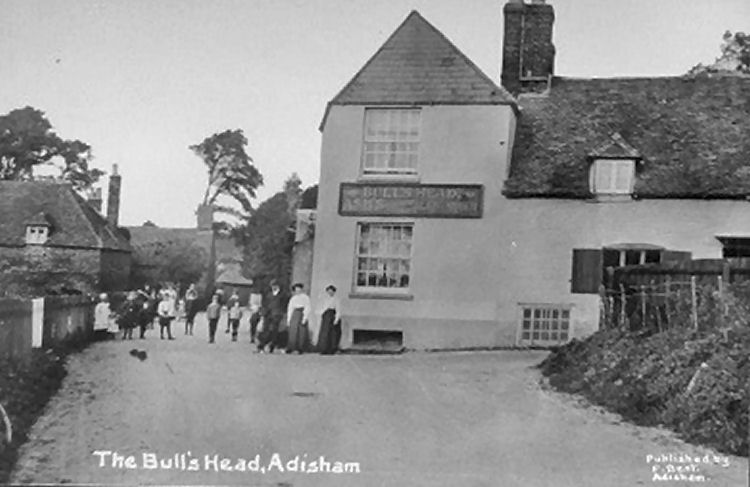
Above postcard, 1919. Kindly sent by Rory Kehoe. |
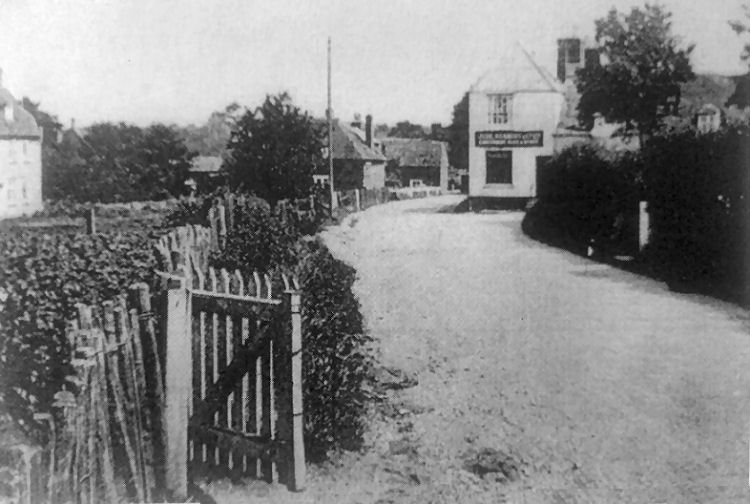
Above photo, 1929. Kindly sent by Rory Kehoe. |
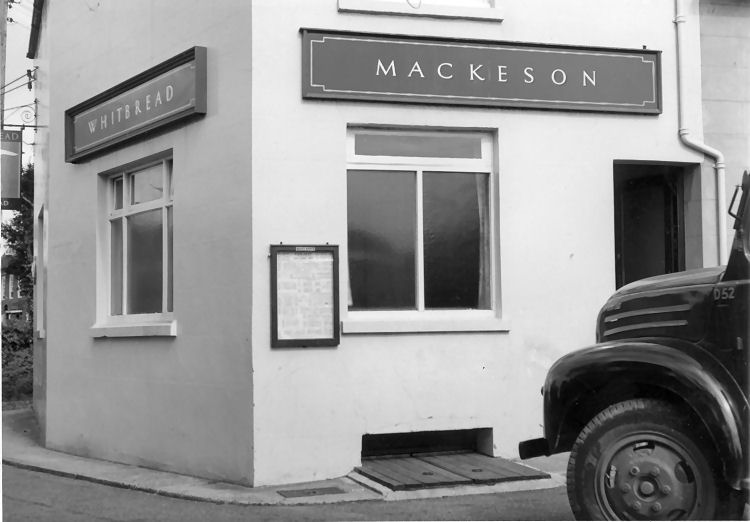
Above photo 25 August 1960, kindly sent by Clive Bowley. |
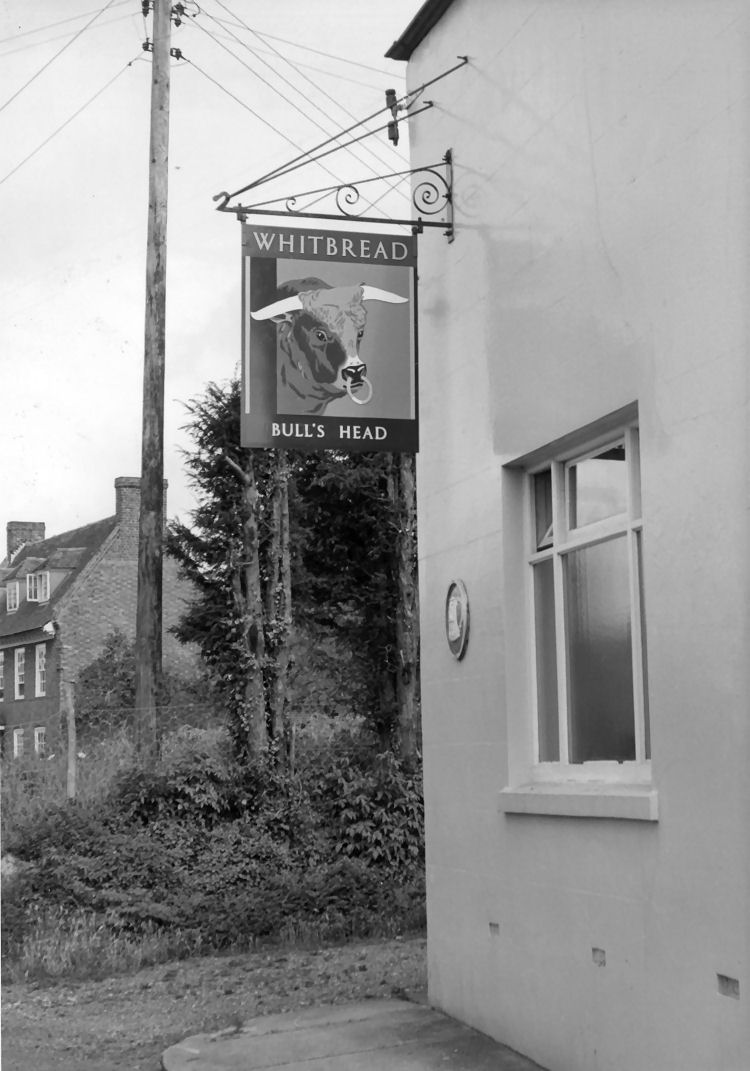
Above photo 25 August 1960, kindly sent by Clive Bowley. |
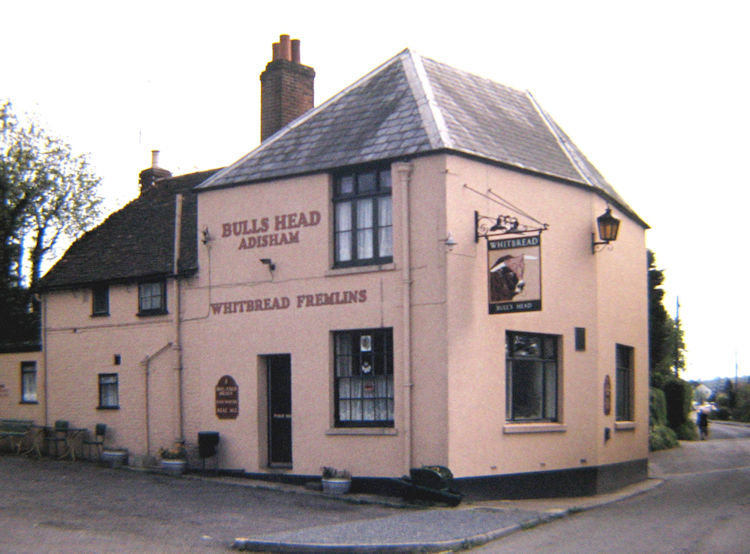
Above photo, 30 May 1984, by Jim Ashby. |
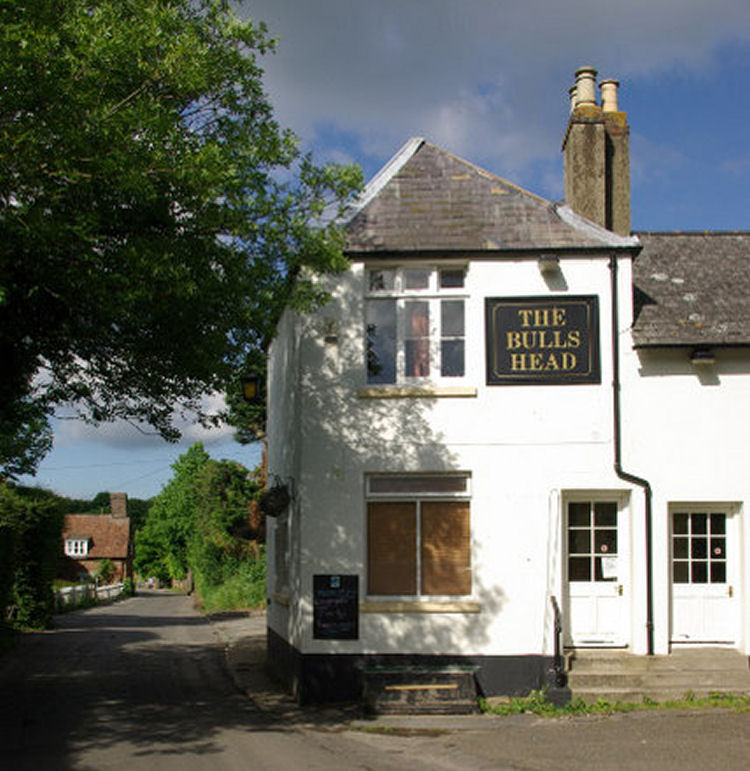
Photograph by Stephan McKay.
http://www.closedpubs.co.uk/ |
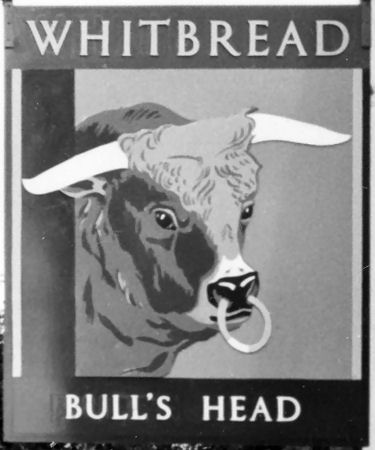
Above sign 1960, kindly sent by Clive Bowley. |
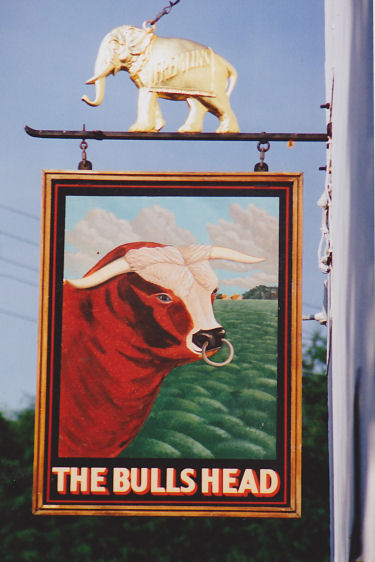 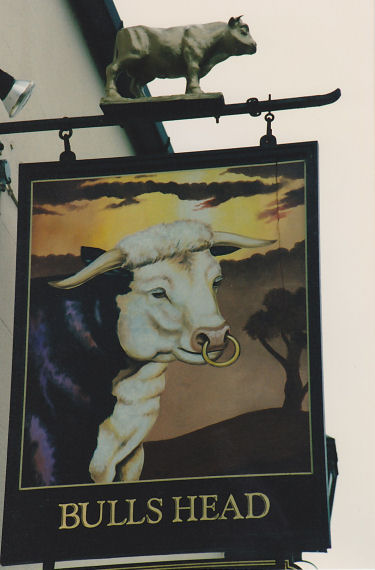
Left July 1991
Right July 1996
Above with thanks from Brian Curtis
www.innsignsociety.com |
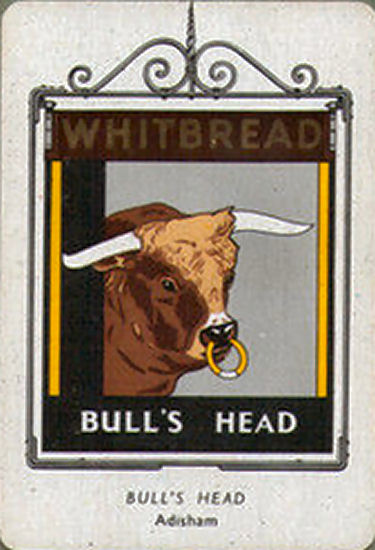
Above aluminium card issued June 1951. Sign series 3 number 8. |
Earliest reference found so far is in the Wingham Division Ale Licence
list, which shows the "Bull's Head," Adisham, to be re-licensed for the sum of 8 shillings in
1740 indicating that the pub was present before 1740.
It appears to have been tied to a brewery owned by the prominent Sandwich
family, the Wyborns to 1822. In 1764 William Wyborn, brewer, died and his
business was left to his daughter Mary, who had married John Bradley. Their
son, William Wyborn Bradley was born in 1752 William being described as
"common brewer of Sandwich." William was elected Mayor Sandwich in 1785 and
died in 1788. The Sandwich brewery and its tied estate of 27 pubs was
eventually put up for "sale by private contract" by William's son (also
called William Wyborn Bradley, born 1779) as advertised in the Kentish
Gazette on 10th May 1822.
|
From the Kent Herald, 19 January 1826.
Kent. Freehold and Leasehold Public Houses and other Estates.
At Word, Fingersham, Northbourne, Sutton (next Dover,) Eastry, Tilmanstone,
Eythorne, Frogham, Womenswould, Addison, Barham, Woodnesborough, Goodnestone
(next Wingham,) Ash (next Sandwich,) Shoulden, Walmer, Ramsgate, Margate, Sarr.
St. Peter's, (Thanet) and Sandwich.
For sale by auction, by Pott and Denne.
At the "Bell Inn," in Sandwich, on Monday, the 13th day of February, 1826, at 11
o'clock in the forenoon precisely, (subject to such conditions and restrictions
as will be then and there produced,) the following Freehold and Leasehold Public
Houses and Estate's, in 27 lots, viz:-
Lot 1:- The "Crispin," public house, at Word.
Lot 2:- The "Jolly Gardener," ditto, at Finglesham, in the parish of Northbourne.
Lot 3:- The "Hound and Hare," ditto, at Northbourne.
Lot 4:- The "Star and Boot," ditto, at Sutton (next Dover.)
Lot 5:- The "Bull," ditto, at Eastry, with cottage adjoining.
Lot 6:- The "Three Colts," ditto, at Tilmanstone.
Lot 7:- The "White Horse," ditto, at Eythorne.
Lot 8:- The "Red Lion," ditto, at Frogham.
Lot 9:- The "Rose and Crown," ditto, at Woolwich Green, in the parish of Womanswould.
Lot 10:- The "Bull Head," ditto, at Adisham.
Lot 11:- The "Duke of Cumberland," ditto, at Barham.
Lot 12:- The "Charity," ditto, at Woodnesborough.
Lot 13:- The "Three Crowns," ditto, Goodnestone (next Wingham.)
Lot 14:- The "Admiral Harvey," ditto, at Ramsgate.
Lot 15:- The "Ship," ditto, at Ramsgate, with two small cottages at the back.
Lot 16:- The "Red Lion," ditto, at St. Peter's, (Thanet) with cottage adjoining.
Lot 17:- The "Crown and Thistle," ditto, at St. Peters, Thanet.
Lot 18:- The "Crown," ditto, at Sarr.
Lot 19:- The "King's Head," ditto, in Walmer Road.
Lot 20:- The "Duke of York," ditto, in Walmer Road.
Lot 21:- The "Chequers," ditto, in the Sandhill's, in the parish of Shoulden.
Lot 22:- The "Ship Inn," at Ash next Sandwich with extensive stabling, yard,
Gardens, &c.
Lot 23:- A Dwelling House, near or adjoining the last lot, in the occupation of
Mrs. Maria Green.
Lot 24:- Three Cottages, adjoining the last lot, with the gardens used theirwith,
now in the several occupations of Vincent Noble Kennard, John Harrison, and
Steven Solly.
Lot 25:- All that building and Hop Oast, next or adjoining the last lot now in
the occupation of Mr. Thomas Minter Tomlin
Lot 26:- A Freehold Dwelling House, and Premises, in Church Square, Margate, in
the occupation of William Dale.
Lot 27:- The "New Inn," in Sandwich, with Assembly Room, Theatre, Stables,
Yards, &c.
N.B. Lots 19, 20, and 21, are leasehold, and all the others freehold.
The premises may be viewed on application to the respective tenants, and printed
particulars had (seven days prior to the day of sale) of the auctioneers, and at
the "Bell Inn," Sandwich; "Kings Head Hotel," Canterbury;
"Antwerp Inn" Dover;
"Black Horse Inn," Deal; "Spread Eagle Inn," Ramsgate; "York Hotel," Margate; of
Mr. Benjamin Hall, Solicitor, No. 2, Serjeant's Inn, Fleet Street, London; and
at the offices of Mr. Noakes, Solicitors, Sandwich.
|
|
From the Kent Herald, 14 September 1826.
Triple Accident.
It falls to our lot this week to relate one of the most melancholy accidents we
ever recorded. On Sunday last, as a respectable man named Court, landlord of the
"Bull" at Adisham, (accompanied by his wife and sister) was journeying into
Canterbury, in a one horse chaise; when he had reached Gutteridge-bottom, near
this city, the horse shied, and instantly commenced kicking violently. In order
to preserve the female companions from injury, Mr. Court alighted, and the
horse, finding himself released from the pressure of the rain, galloped off at
full speed, drawing and kicking the driver, in consequences of his having become
entangled with the harness, until he reached the turnpike gate; during which
Mrs. and Miss Court were clinging to the hinder part of the chase. Mr. Court was
taken up as soon as some person had collected on the spot; when it was found
that his face, from the chin, was horribly torn, which has rendered him a
terrible object. His body was also severely injured. He was conveyed to the Kent
and Canterbury Hospital, with little hope of recovery.
|
|
From the Kentish Gazette, 21 July 1840.
DEATH.
June 29, at Adisham aged 55, Judith Ann, wife of Mr. Thomas Folwell, of
the "Bull's head;" also at the same place, July 9, Maria Sarah, wife of
Mr. George Crux, mariner, sister of the above.
|
|
From the Kentish Gazette, 18 July 1843.
DEATH.
July 13, at Adisham, much respected, Mr. Thomas Court, aged 84, formerly
or the "Bull's Head" public house.
|
|
South Eastern Gazette,24 January, 1860.
ADISHAM. Fatal Accident on the London, Chatham, and Dover Railway
Works.
On Monday C. J. Fox, Esq., deputy coroner, held an inquisition at
the "Bull’s Head" public-house, in this parish, touching the death
of James Morris, who was killed while employed on the railway works.
John Preston, a labourer, deposed that on the previous Saturday
afternoon the deceased was preparing to unhook a horse from some
full trucks, when the animal fell against him, and drove him between
the wall and the roadway.
The corner of the fore waggon then caught deceased full in the face,
and the wheel passed over his thigh. Witness immediately went to his
assistance, and found deceased completely mangled about the face. He
never spoke after the accident. Witness did not think the accident
would have happened if the horse had not fallen down.
George Sheppard, another labourer, who was near the spot when the
deceased was killed, gave similar evidence.
Wm. Capon (contractor for the railway works at Adisham) said that
the mode of unhooking the horses from the trucks was the same as was
adopted in all other railway works. The accident would have happened
all the same if a spring bar for unloading the trucks had been used,
if the horse had stumbled. The deceased was 40 years of age.
Verdict, "Accidental death."
|
|
From the Kentish Chronicle, 21 January, 1860.
ADISHAM. INQUEST.
An inquest was held on Monday, before Charles James Fox, Esq,. deputy
coroner for the county, at the "Bull's Head Inn," Adisham, on the body
of J. Norris, a labourer on the works of the London, Chatham, and Dover
Railway. From the evidence of his fellow labourers, it appeared that on
Saturday last the deceased was in charge or some full trucks at a
cutting near Adisham, and was in readiness to unhook the horse from the
foremost truck, when the horse stumbled and fell, knocking the deceased
on to the rails, and before be could recover himself the corner of the
truck struck and smashed his head so severely as to cause instantaneous
death.
Verdict, "Accidental Death."
|
|
South Eastern Gazette, 24 January, 1860.
BARFRESTONE.
The late Fatal Accident at the Railway Works.
In our last we reported the death of James Bragg, a labourer, who
had died in the Kent and Canterbury Hospital, from the effects of
injuries received while engaged on the London, Chatham, and Dover
railway works, in the parish of Nonington, near this place. An
inquest has since been held on the body by one of the county
coroners, T. T. Delasaux, Esq., at the "Royal Oak," in Longport,
Canterbury, when the following account of the accident was given by
a fellow labourer:—
Philip Morgan, employed on the railway works at Nonington, stated
that on Wednesday, the 11th inst., the deceased (who was 37 years of
age) was engaged driving a tip waggon on the railway loaded with
chalk, and drawn by one horse, towards the heading. By some means
the horse trod on his foot, and he was thrown to the ground. The
wheels of the loaded waggon then passed over his left thigh, and
completely smashed it. The deceased was immediately lifted up, and
conveyed as quickly as possible to the Kent and Canterbury Hospital
at Canterbury.
One of the nurses at the hospital, Ann Dalrymple, spoke to the poor
fellow’s admission into that institution at about 2 o’clock on the
day in question. He was immediately attended to by the house
surgeon, and his leg at once amputated. He died at about half-past 7
on the following Saturday morning.
The Coroner took occasion to remark upon the large number of men
upon whose bodies he had held inquests since the commencement of the
East Kent Railway, whose deaths had been caused in a similar manner
to that of the deceased’s, and he inquired if there was not some
better means that might be adopted for tipping the waggons — of a
less dangerous character than the plan at present is practice?
Mr. Walker (one of the contractors) replied in the negative, so far
as he was aware of.
Verdict, "Accidentally killed."
|
|
Maidstone Telegraph, Rochester and Chatham Gazette, Saturday 15 December 1860.
Adisham Suicide.
The deputy coroner, C. J. Fox, Esq., held an inquest at the "Bulls Head
Inn," in this parish, on Tuesday last, touching the death of a labouring
man named John Keeler, who was found suspended from a tree on the
previous morning.
Sarah Ann Rye, a widow, deposed that the deceased resided at her house.
At about half past 5 o'clock on Monday morning he left home as usual, to
go to his work, at Mr. Clark's farm, apparently in his usual spirits. In
consequence of receiving a message from Mr. Clark that the deceased had
not been to work, at about 7 o'clock, witness went towards the farm, and
on her way there she saw the deceased hanging from an oak tree. She
immediately gave an alarm. The deceased was about to be married to
witness, and notice of the same had been given. The deceased was of a
reserved disposition. There had been no quarrel or misunderstanding
between them, and witness could give no reason why he had committed
suicide. She had six children living by her former husband, the
deceased's wages were, she believed, 14s. per week.
Thomas Young, parish constable, proved that he found the deceased quite
dead, and assisted to cut the body down. He had known him since he was a
boy, and he was a very quiet, inoffensive person. Witness knew nothing
that would lead the deceased to destroy himself.
William Castle, brother-in-law to the deceased, stated that he
(deceased) had been very low spirited since Michaelmas last, and had
often remarked that he did not think he could maintain Mrs. Rye and her
large family, if he married her. Witness believed it was on that account
that the deceased committed suicide.
Verdict "Temporary insanity."
|
|
South Eastern Gazette, 11 December, 1860.
Suicide of a Labourer just before Intended Marriage.
The deputy coroner, C. J. Fox, Eeq., held an inquest at the "Bull’s
Head Inn," in this parish, on Tuesday last, touching the death of a
labouring man named John Keeler, who was found suspended from a tree
the previous morning.
Sarah Ann Eye, a widow, deposed that the deceased resided at her
house. At about half-past 5 o’clock on Monday morning he left home
as usual, to go to his work, at Mr. Clark’s farm, apparently in his
usual spirits. In consequence of receiving a message from Mr. Clark
that the deceased had not been to work, at about 7 o’clock, witness
went towards the farm, and on her way there she saw the deceased
hanging from an oak tree. She immediately gave an alarm. The
deceased was about to be married to witness, and notice of the same
had been given. The deceased was of a reserved disposition. There
had been no quarrel or misunderstanding between them, and witness
could give no reason why he had committed suicide. She had six
children living by her former husband. The deceased’s wages were,
she believed, 14s. per week.
Thomas Young, parish constable, proved that he found the deceased
quite dead, and assisted to cut the body down. He had known him
since he was a boy, and he was a very quiet, inoffensive person.
Witness knew of nothing that would lead the deceased to destroy
himself.
Wm. Castle, brother-in-law to the deceased, stated that he
(deceased) had been very low-spirited since Michaelmas last, and had
often remarked that he did not think he could maintain Mrs. Rye and
her large family, if he married her. Witness believed it was on that
account that the deceased committed suicide.
Verdict, "Temporary insanity."
|
|
From the Kentish Chronicle and General Advertiser, 2 November, 1861. Price 1 1/2d.
FATAL RAILWAY ACCIDENT AT ADISHAM.
An inquest was held at the “Bull Inn,” on Wednesday, by T. T. Delasaux,
Esq., on the body of a railway labourer Named John Coley, who was
accidentally killed on the previous afternoon, having been run over by
the up train which leaved Dover at a quarter past four.
Mr. Clarke appeared to watch the proceedings on behalf of the company,
and Messrs. Hall and McDonald on the part of the contractors.
Two Jurors named John Baker and Robert Brenchley were fined for not
attending, after having received the usual notice.
The following evidence was taken:—
George Birch:— I live at Canterbury, and am a labour. Yesterday I was at
work on the London, and Chatham, and Dover Railway, as was also the
deceased. He was crossing the line with a wheelbarrow, in the parish of
Adisham. I took the barrow from his back, and he then turned and said
“Well, mate, here comes the quarter past four train,” and almost
immediately I looked round and saw him on the up line, just in front of
the engine, which was attached to the train just spoken of, and which
was approaching him. I called out to him, but he was struck by the
engine and thereby killed. I believe that the deceased had been employed
on the line two or three months. I am satisfied that no blame can be
attached to any person, nor can I account for the deceased being on the
line. I am clearly of opinion that his death was purely accidental.
Alfred Goulden, station-master at Adisham:— Yesterday the deceased and
other persons were at work on the London, Chatham, and Dover Railway.
About twenty-six minutes past four o'clock in the afternoon I was on the
platform, and saw the express train approaching the station from Dover,
and as soon as it had past the said station I heard a danger whistle
from the engine of the said train, and on looking forward I saw the
deceased lying on the Dover line, and blood flowing from his mouth. He
immediately died from the injuries he had received.
The jury returned a verdict of “Accidental Death.”
|
|
From the Maidstone Telegraph, Rochester and Chatham Gazette, 9 November 1861.
Adisham. Fatal Accident.
On Wednesday last, Mr. T. T. Delasaux, county coroner, held an inquest
at the "Bull's Head Inn," on the body of John Coley, labourer on the
London, Chatham, and Dover Railway.
George birch, labourer, said that on Tuesday he was at work with the
deceased on the railway near to the Adisham station, on the Canterbury
side. The deceased crossed the line with a wheelbarrow, when witnessed
took it from him. The deceased then said, Well, mate, the 4:15 train has
arrived. Immediately afterwards witness looked round and saw deceased on
the up line just in front of the engine that was approaching. Witness
called out to him, but the engine struck the deceased immediately,
flinging him about 30 yards onto the down line, and he died a few
minutes afterwards. The deceased had been in the employ of the company
for the last two or three months. There could be no blame attached to
any person, and it was witnesses belief that the deceased was killed
accidentally. The station master at Adisham said deceased and other
persons were working on the line, and at a little after 4 o'clock on
Tuesday afternoon, witness was on the platform and saw the express train
approaching from Dover. As soon as it had reached the station witness
heard the danger whistle proceeding from the engine, and on witness
looking towards the engine, he saw the deceased lying on the downline
and blood flowing from his mouth. He died almost immediately from the
injuries he had received from being knocked down. Verdict, "Accidental
Death." The coroner had occasion to fine two of the jury, John Baker and
Robert Brenchley, 5s. each for non attendance at the inquest, in
pursuance of the notice given them.
|
|
From the Kentish Chronicle, 2 July, 1864.
Alexander McCluskey, 26, marine, was charged with unlawfully and
maliciously wounding John Scott, and doing grievous bodily harm to him,
at Adisham, on the 4th April, 1864. The prosecutor and prisoner lodged
together at the “Bull Inn,” at Adisham, and the prisoner on the morning
of the day named in the incident alleged that he had lost a sovereign
from the bed room, and asked the prosecutor if he had taken it in a
joke, prosecutor assured him he had not, with which statement he
appealed satisfied; but in the evening, after they had been drinking
together in the tap-room, the prisoner rushed upon the prosecutor and
stabbed him in several places on his head and upper part of his person.
The landlady, Mrs. Russell, run to the assistance of the wounded man,
and wrenched a knife from the hands of the prisoner, who was given in
charge of the police constable, and the prosecutor was conveyed to the
Kent and Canterbury Hospital; the surgeon of which establishment gave
evidence as to the nature of the wound inflicted, which though of a
severe character were not dangerously so. Buss, the policeman, who took
the prisoner in charge, stated that when he apprehended him, the
prisoner admitted that he had committed the offence, and added “God only
knows what made me do it.”' When called on for his defence he said be
was very sorry for that which he had done. He said he had been drinking
to excess for some days previous, and did not know what he was about; he
had no more to say in his defence, and threw himself on the mercy of the
Court. After some suitable remarks on the enormity of the offence he had
been found guilty of, he was sentenced to twelve months’ imprisonment at
St. Augustine’s.
|
|
From the Whitstable Times and Herne Bay Herald. 17 August 1867. Price 1d.
ADISHAM. A DETERMING PUGILIST
At the County Magistrates Office, Canterbury, on Saturday, a youth named
Thomas Pegden was charged with assaulting Henry Reynolds. Complainant
stated that a short time previously he left the "Bull" at Adisham, where
he had been drinking in the same room as defendant. Several companions
of the lad were "hustling" about outside the inn, and witness turned
round to look at them. Pegden came up, and without any provocation
struck him a blow on the face. Defendant then said to witness, "You gave
me a horsewhipping once, and I promised myself to give you a thrashing
when I became man enough." He accordingly "pitched into witness" again,
blacked his eyes, and caused blood to flow freely from his nose and
mouth. Defendant's father, who was in court, said it was true Reynolds
had some time since horsewhipped his son most unmercifully, and the
latter had ever since “bosomed" a desire to give him a “hiding.” He (the
father) knew it was wrong, but could not control the actions of the boy.
The Bench ordered the defendant to pay a fine of 20s. and costs. The
father paid the money.
Pegden was then charged with assaulting a fellow labourer named Allen.
The Bench asked Allen if he wished to press the charge. Complainant
answered: “It 'twas fair I wouldn't mind; but he laid up in a churchyard
for me, and I don't see that I should be "bat" about for nothing." The
case was accordingly proceeded with, and the facts showed that, after
assaulting Reynolds, Pegden waylaid Allen, with whom he did not appear
to have had any quarrel, and when he was passing the churchyard on his
way home he knocked him about to such an extent that complainant had
been unable to work since (a week had elapsed). The chairman here asked
the policeman who had charge of the case what character the accused
bore. The constable said that he had been convicted of stabbing, and had
suffered imprisonment. His pugilistic liking made him "the terror of the
neighbourhood.” He was sentenced to two months' hard labour at St.
Augustine's, and ordered to pay the costs, or suffer a further
incarceration of seven days. The father (an old man) paid the costs.
|
|
From the Dover Express and East Kent News, Friday 6 May, 1881. 1d.
WINGHAM PETTY SESSIONS
FINES FOR CRUELTY TO ANIMALS
At these sessions, J. Henderson, Esq., presiding, Henry Bushell,
inkeeper of Adisham, was fined £5 and costs for allowing horses to be
worked in an unfit state, and George Adams and Frederick Penfold, in the
defendant's employ, were fined £1 each and costs for the same offence.
|
|
From the Whitstable Times and Herne Bay Herald. 14 July 1894. Price 1d.
W. G. DEVERSON v V. ROBERT TURTLE.
Mr. Martyn Mowll appeared for the plaintiff, who keeps the “Bulls Head”
at Adisham.
Mr. H. Broughton defended.
This was a claim for £3 17s. for keep of two horses.
There was a counter claim for £33 for loss of a horse and depreciation
in value of a pony.
William George Deverson deposed that he hired with the “Bull Inn” a
pasture field of nearly 12 acres. He saw an advertisement about
Michaelmas for keep, and he subsequently took two horses in to keep. The
pony was in good condition, but the horse, which was a “caste one,” was
worn out. He kept the two animals in the field during the day and in the
yard at night. When his bill came to £3 he sent it in, but got no reply.
He than wrote to ask the defendant to take them away, which be
ultimately did one Sunday without witness's knowledge. When witness saw
defendant he offered to sell the horse for 15s., which witness said he
would have and he could take it off the account. Defendant did not agree
to that.
James Husk, waggoner to the last witness, George Phillips, and two
others corroborated.
Defendant said he advertised for keep, and when he sent the horse it was
in good condition, he thought it was worth £15. The cob was fat and he
was offered £22 for it, but would not sell it. When he went to take them
away he hardly knew the horse, and the cob was not quite so bad. Going
along the road the horse fell down, they got it up. He subsequently had
to have the horse killed, and the cob had to be doctored.
William Castle, - Stratford, S. E. Smith, F. Farley, F. Spain, and W.
Pierce all gave evidence as to the bad condition of the horses.
His Honour gave judgment for plaintiff for his claim and the
counterclaim.
|
|
From the Dover Express and East Kent News, Friday,
8 November, 1929.
PLANS FOR APPROVAL
Plans for alterations to the public bar of the "Bull's Head," Adisham,
were submitted by the Architect for the Brewers, who said the alterations
would make the premises more light and airy. They were putting in more
windows and making an open central servery.
The plans were approved.
|
|
Dover Express 22nd August 1941. Wingham Petty Sessions 21st August 1941.
AN ADISHAM ASSAULT.
Patrick Burkett of Adisham was summoned for assaulting Joseph Thomas
Davies on July 30th and for using obscene language on the highway. He
pleaded guilty to both offences.
Davies gave evidence that he helped the landlord at the “Moor’s Head”
and, on July 30th, at closing time, he asked defendant to leave, but
defendant refused and used bad language. Defendant eventually left and,
when they got outside, punched witness twice in the chest and knocked
him down.
P.C. Wissenden said that, at 10.25 p.m. on 30th July, he heard defendant
using obscene language and a woman opened her window and complained of
it. Defendant had had some drink, but was not drunk.
Defendant said that he was drunk and was very sorry it happened.
Fined £1 for assault and £1 for using obscene language and ordered to
pay 16s costs.
|
|
Dover Express 29th August 1941.
In the report of Wingham Petty Sessions last week, the public house
referred to in the Adisham assault summons was incorrectly given. It
should have been the “Bull’s Head”.
|
|
From the Dover Express and East Kent News, 19 September, 1947.
ADISHAM LICENSEE’S FATAL FALL.
The Deputy Coroner for East Kent (Mr. Wilfred Mowll), conducted an
inquest at the "Bull’s Head," Adisham, on Monday, on Henry Edward Pooley,
aged 58 years, the licensee there for about seven years, who fell down
the cellar steps on Saturday night and died within a few minutes.
Edward Henry Pooley, a coach builder said he resided at the "Bull's
Head" with his father (the deceased) and on Saturday, he spent almost
the whole evening in his company. His father was a rather heavily built
man and enjoyed good health. He looked after his own cellar. On Saturday
evening his father had only one or two halfpints of beer and was all
right. After "time" had been called at 10.30 p.m., witness went into the
dining room with his brother-in-law, Mr. Leonard G. E. Butler, and
sister. Shortly alter there was a crash in the cellar, and they found
deceased lying in a pool of blood at the foot of the cellar steps. The
cellar light was on, and also at the foot of the steps was a bucket
lying on its side and a broken glass, which, he imagined, his father had
carried down with him. He was bleeding from the head and nose, and
appeared to be unconscious. He made his father comfortable and
telephoned the doctor. The cellar steps were steep, but strong, and had
a handrail either side. Witness said his father had a fit last January
and was attended by Dr. Mercer. He had not complained since, but spent
one day in bed last week as he was a little feverish. His father often
went down the cellar with his hands full, and without using the
handrail. No one was in the bar when deceased fell.
Dr. Roger D. Hunter, of Bridge, said that when he arrived at the "Bull's
Head," at 10.45 pm. on Saturday. Pooley was at the bottom of the steps
dead. There was profuse haemorrhage from the mouth and nose and a very
extensive depressed fracture or the frontal area of the skull. The
injuries included fractures of the vault and base of the skull and were
consistent with deceased having fallen down the steps face forward.
Death was due to laceration of the brain and haemorrhage, resulting from
the fractures. Earlier this year, deceased had seen Dr. Mercer,
witness’s partner, and complained of dizziness and "blackout," which was
attributed to a fit. Pooley made a fairly rapid recovery. On Saturday,
he might have had a blackout or slipped.
The Coroner, recording a verdict of death by misadventure, said it was
probable deceased had a blackout similar to that suffered earlier.
|
|
From the Dover Express and East Kent News, Friday, 5
March, 1965.
OVER SHE GOES.
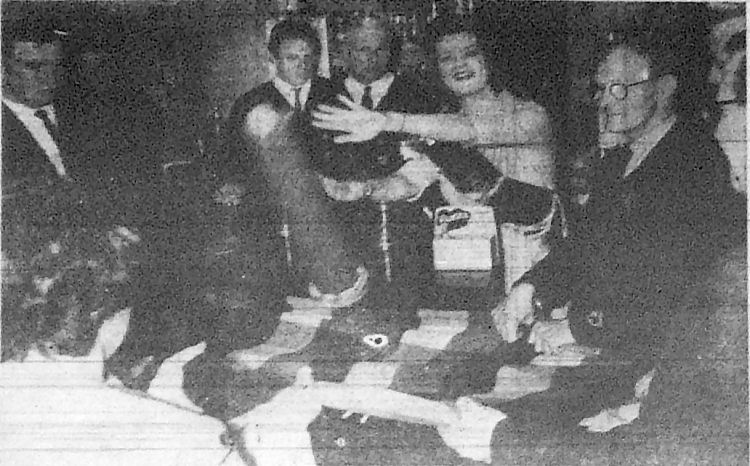
Miss Valerie Atkins, Folkestone's beauty queen last Saturday pushes
over the pile of pennies collected for cancer research at the "Bull's
Head," Adisham.
Valerie (20), a chemist's assistant, collected a handsome addition to
the funds from the customers at a shilling a time to guess the pile's
total before toppling it.
She also made he draw for a highly successful fund-raising raffle and
Mr. Ted Savage, the British Empire Cancer Research Campaign's local
chairman was very well satisfied with the £20 he was able to take home.
The pile of pennies is only one of the things that ex-Folkestone
policeman, Water May, has started in Adisham since he took over that pub
in 1963. A youth club and a club for the over-sixties also owe their
existence to him.
|
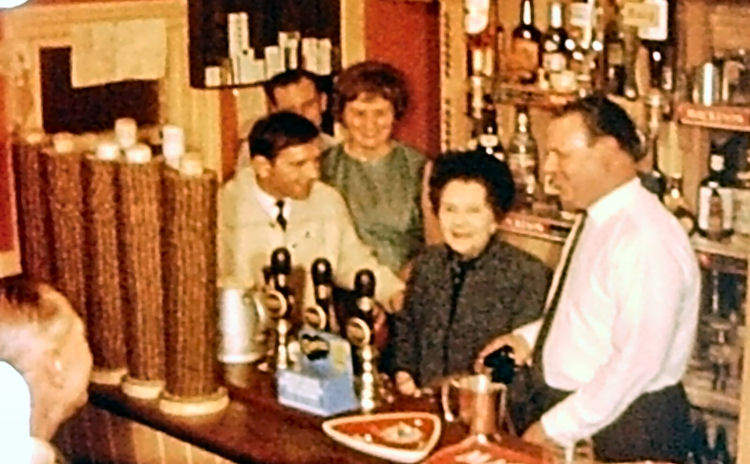
Is the liocensee Walter May? That is Norman Wisdom
in the black tie and white jacket. |
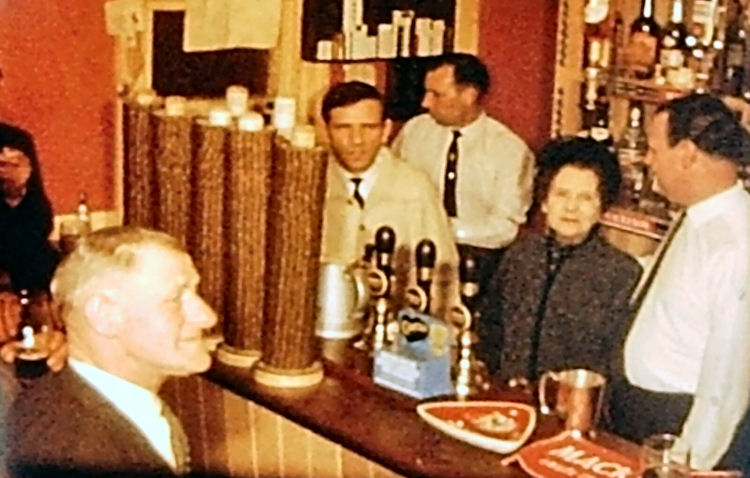
Probably saving for the British Empire Cancer Research Campaign's. |
|
|
From the Dover Express, 9 October, 1970.
NEW LANDLORD.
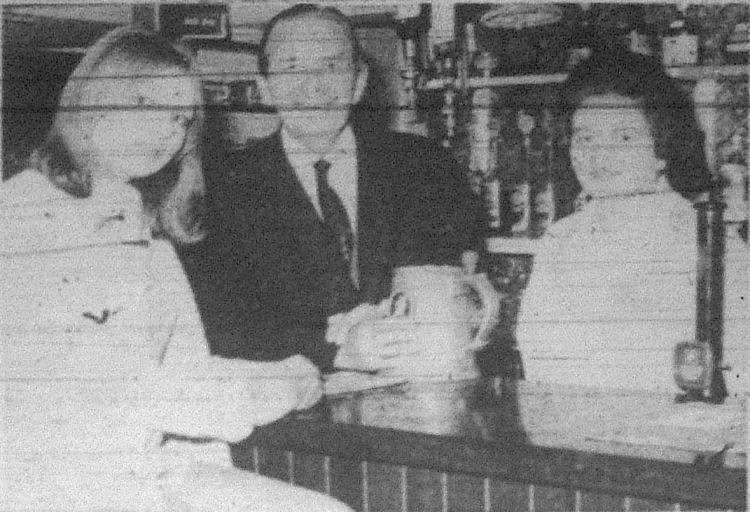
Above photo shows Mr. and Mrs. John Southey and daughter Anetta
settling in to their new life at the "Bull's head," Adisham.
New landlord of the "Bull's Head," Adisham is a former publicity
officer for Dover, 47 year-old Mr. John Southey.
Mr. Southey, his wife and daughter Anetta, have moved from their
Lydden home to the village pub, and they were behind the bar for the
first time this week.
Mr. Southey resigned as publicity officer two months ago because he
said he was being treated like an office boy. This followed his removal
from his own entertainments and publicity office at the Town Hall, to
the Town Clerk's department, at New Bridge House.
He had played an active part in the promotion of East Kent as a short
term holiday centre for French and Belgian visitors.
At present Dover is without an officer with direct responsibilities
for entertainments and publicity.
|
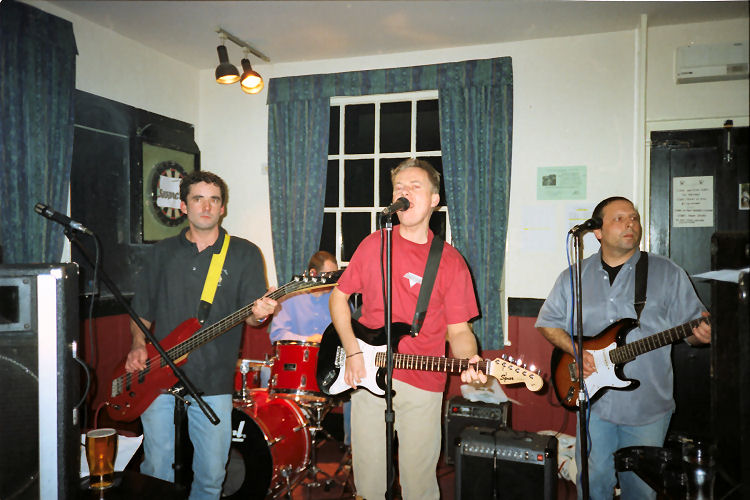
Above photo 1 November 1998, showing the band "Suspect" kindly taken and
sent by Dougie Moon who was the drummer. |
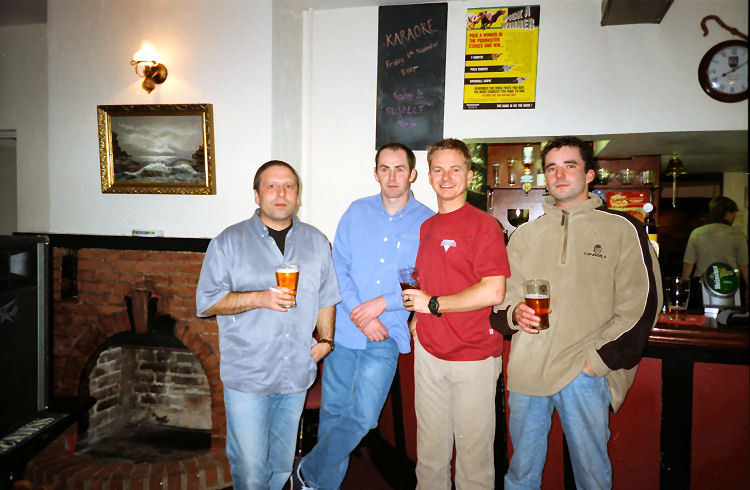
Above photo 1 November 1998, showing the band "Suspect" kindly taken and
sent by Dougie Moon who was the drummer, second from left. |
Unfortunately another one closed. (Information gained 2009).
|
Information taken from
http://www.idmproperties.com 20 December 2013
IDM have been
running the planning application for the conversion of this derelict pub
on behalf of a client.
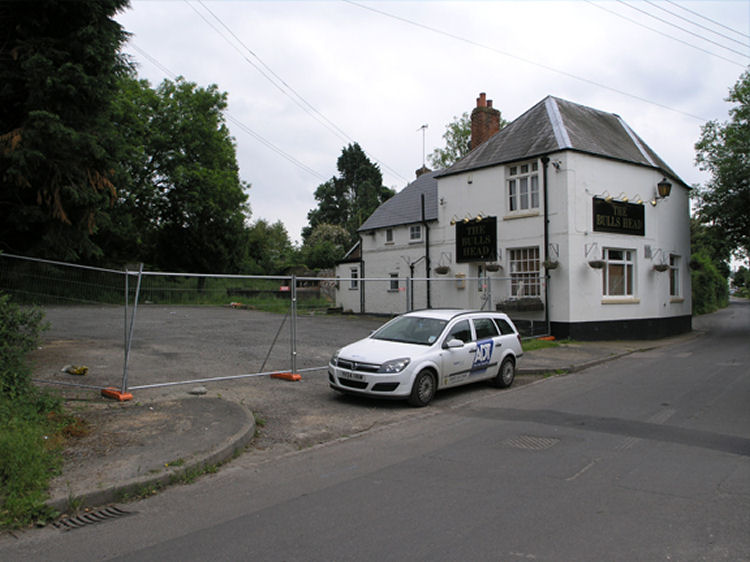
After the pub closed down the local residents put up fierce
objections to losing the community use on the site, IDM initial
application to convert the existing building and add new buildings to
produce 4 houses was turned down. IDM have since negotiated with the
local council and residents, and have produced a scheme that will
produce 2 new houses on the site and new flat in the existing building
and also a community shop for the local residents to use.
The Bulls Head planning application was approved in August 2011 and
sold on with the benefit of the consent.
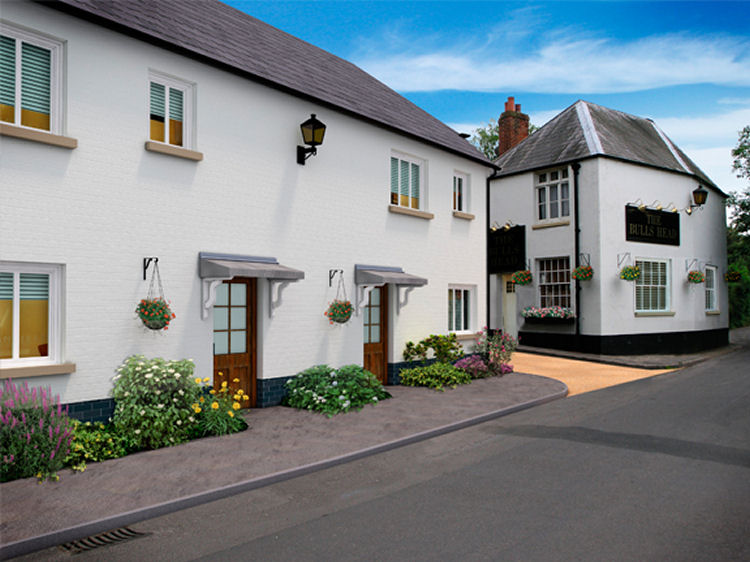
Above CGI picture showing the proposed building.
|
|
From an email received 8 August 2014.
Hello,
I am writing to let you know that my Dad and Mum had the licence for
the "Bulls Head" from 1960 to 1963. There names were Percy (Pat) and
Joan Morris. I was just a small child and attended the village school.
My teachers were Mrs Shaw and Miss Fox.
Dad had great success in getting mystery bus tours to stop at the
"Bull" and he caused something of a stir when one Saturday night he had
six buses lined up outside, this probably doesn't sound too exciting but
in those days there were only two buses a week, one on Wednesday and one
on Saturday. I loved my time in the village but we left there to go to
Hertfordshire where my dad became the Manager for the Staff Sports and
Social Club of the Shenley Hospital. We emigrated to New Zealand in 1966
and both my parents have since passed away.
Kind Regards,
Jackie Blake. |
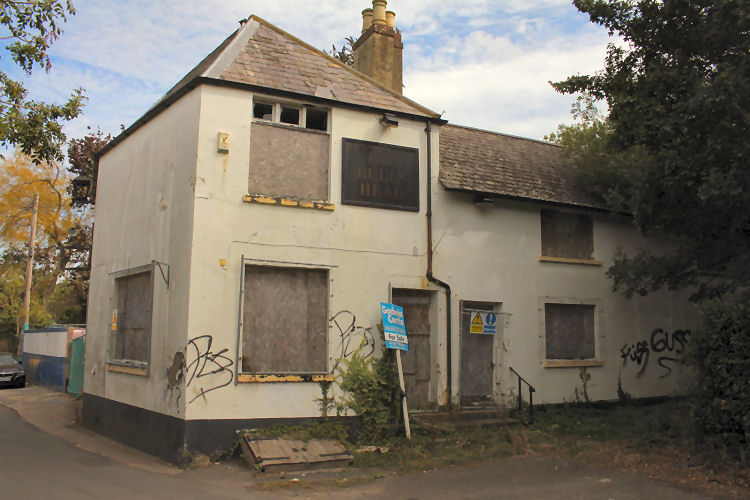
Above photo September 2016, kindly taken and sent by Dougie Moon. |
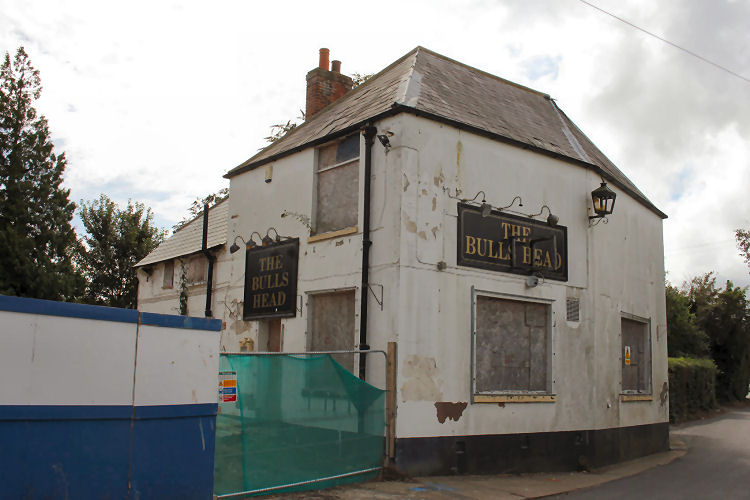
Above photo September 2016, kindly taken and sent by Dougie Moon. |
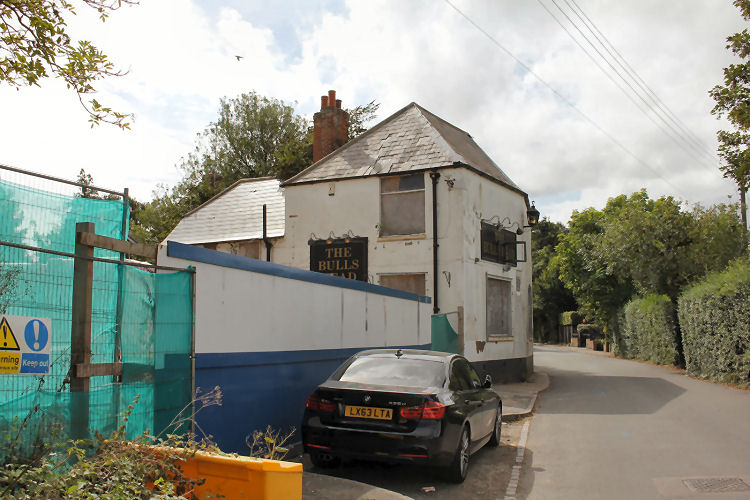
Above photo September 2016, kindly taken and sent by Dougie Moon. |
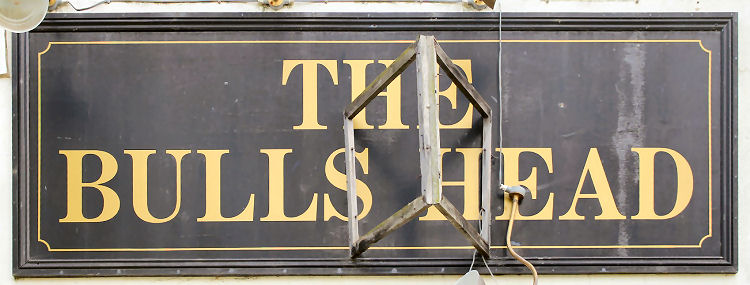
Above photo September 2016, kindly taken and sent by Dougie Moon. |
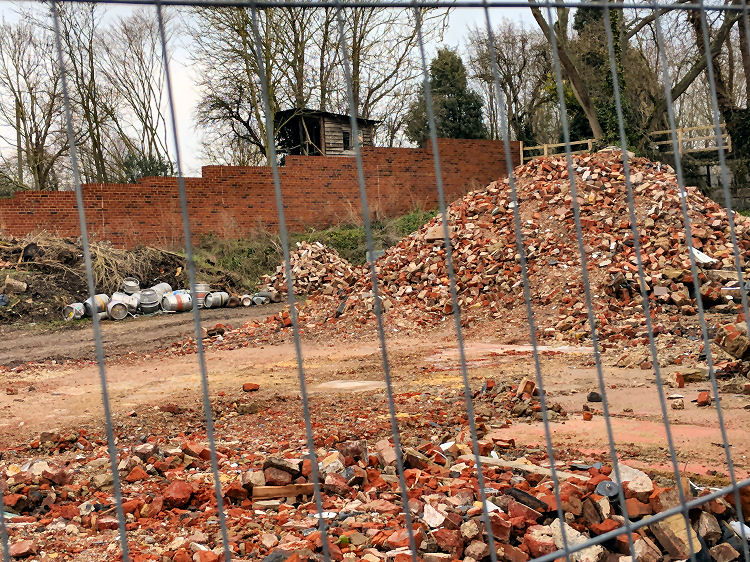
Above photo, January 2018, kindly taken and sent by Ray Hopkins. |
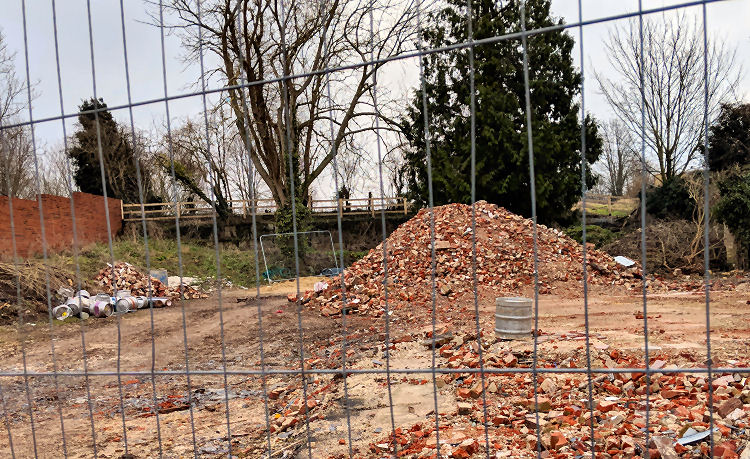
Above photo, January 2018, kindly taken and sent by Ray Hopkins. |
LICENSEE LIST
RIGDEN Richard 1740+

COURT 1826
FOLWELL Thomas 1840-51 (age 45 in 1841 ) )

FOLWELL Mrs Frances 1851-58 (age 62 in 1851 ) )
BUSHELL George 1861-Aug/1863+ (age 43 in 1861 ) ) 
BUSHELL Frances Mrs 1871-78+ (age 43 in 1871 ) ) 
BUSHELL Alfred 1881+ (also fly proprietor age 33 in 1881 ) )
CHEESEMAN Harry 1891 (age 43 in 1891 ) )
EASTMAN Henry 1899+

EASTMAN Richard Henry 1901 (also artist & decorator age 39 in 1901 ) ) 
TUPPREY/TUPPENY T to Jan/1911

HUGHES Henry Thomas Jan/1911-Dec/22 (age 34 in 1911 ) )
  
 FOX Robert William Dec/1922-Nov/29
FOX Robert William Dec/1922-Nov/29

UDEN Mr Charles John Nov/1929-Oct/1937
   (Previously for 15 years with the East Kent Road Car company.)
(Previously for 15 years with the East Kent Road Car company.)
BISHOP Mr H E R Oct/1937-July/40
 
RAWLINGS Mr R P July/1940-Sept/40

POOLEY Mr H Edward Sept/1940-Sept/47 dec'd

POOLEY Mrs Fanny to Nov/1953

 SINCLAIR David Harold Nov/1953-56
SINCLAIR David Harold Nov/1953-56

CARTER E V 1961
MORRIS Percy (Pat) & Joan 1961-63
MAY Walter 1963-65+

SOUTHEY John Oct/1970+
https://pubwiki.co.uk/BullsHead.shtml
http://www.closedpubs.co.uk/bullshead.html
The Dover Express stated that Mr. H. E. R. Bishop had enlisted in H.M.
forces.
 From Wingham Division Ale Licences 1740 Ref: KAO - QRLV 3/1 From Wingham Division Ale Licences 1740 Ref: KAO - QRLV 3/1
 From Bagshaw Directory 1847 From Bagshaw Directory 1847
 From Melville's Directory 1858 From Melville's Directory 1858
 From the Post Office Directory 1874 From the Post Office Directory 1874
 From the Kelly's Directory 1899 From the Kelly's Directory 1899
 From the Kelly's Directory 1903 From the Kelly's Directory 1903
 From the Post Office Directory 1913 From the Post Office Directory 1913
 From the Post Office Directory 1922 From the Post Office Directory 1922
 From the Post Office Directory 1930 From the Post Office Directory 1930
 From the Post Office Directory 1938 From the Post Office Directory 1938
 From the Kelly's Directory 1934 From the Kelly's Directory 1934
 From the Dover Express From the Dover Express
 Census Census
 Kentish
Chronicle Kentish
Chronicle
|























